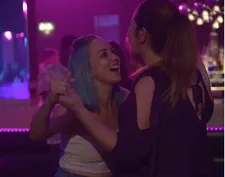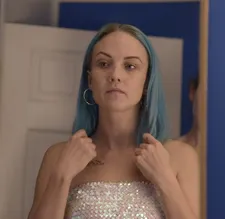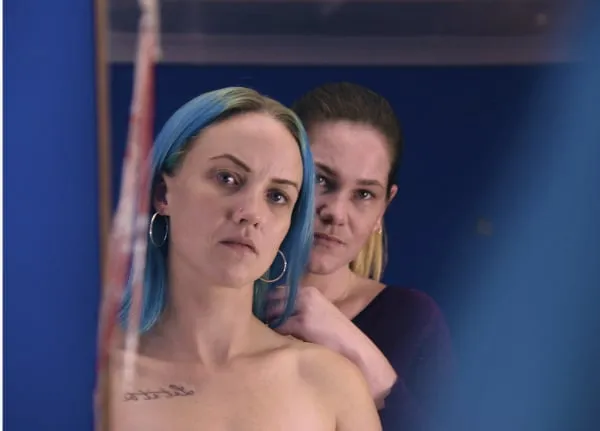Fyzal Boulifa's Lynn + Lucy - which had its world premiere at San Sebastian Film Festival and travels to London Film Festival this week - explores the way that community pressures and a desire for acceptance cause cracks to appear in a lifelong friendship. Set in a working-class suburb, the film stars newcomer Roxanne Scrimshaw as Lynn and Nicola Burley as her best mate Lynn. They have been close friends since childhood but, after the birth of Lucy's first child, circumstances cause something to shift in their relationship.
Boulifa - whose parents migrated to the UK from Morocco - grew up in Leicester which he describes as "a place that's not dissimilar to the one in the film". He added: "I grew up in a very white working-class environment. Obviously, because I had immigrant parents, I was part of it but also had a distance from it. It's only quite recently that I've moved to France. It felt like an opportunity to explore that world in a different way."
His multi-facted and non-judgemental approach to his cameras is unusual in British cinema, which often portrays working-class communities with broad brush strokes - either suggesting that everyone is on the wrong side of the law or implying that nobody has two pennies to rub together. Boulifa says that's definitely something he was aiming to avoid.
He says: "I wanted to make the characters ambivalent in a way that was more reflective of their humanity. I think it's hard to talk about class in England because we're very class obsessed and it can be to extremes. It can become a very nasty demonisation or even disgust towards the working class in England. It's easy to portray them as simple victims or martyrs or insist on their goodness. My feelings are complicated so I wanted to reflect that. But I also wanted it to feel like it's a more human way to show that they're a combination of things and they also reflect their environment."
 |
| Fyzal Boulifa: 'My feelings are complicated so I wanted to reflect that' Photo: Courtesy of San Sebastian Film Festival |
In order to capture the specific feel of a working-class community, Boulifa decided to 'street cast' the role of Lynn - putting adverts in local newspapers and online for non-professionals. It's hard to believe that Scrimshaw doesn't have previous acting experience watching her commanding performance here as a woman torn between a knew sense of self-identity and her old associations. The writer/director says that opting for someone unknown was a risk he had to take after he originally had looked at both professional and non-professional actors.
"I quickly realised that our problem with class in England is very much reflected in the acting world," he says. "I was aware of it from the outside, but when I was in it, it was quite shocking to me how few working-class actors there are in England and what passes for a working-class actor. You get people who regularly play working class but they're not really.
"That was quite sobering. I really felt that these people are just not getting the opportunities - even going back 20 or 30 years, I think the situation was much better than it is now. There's a real sense that there aren't the opportunities. I realised that I wanted Lynn just to be able to 'be'. I didn't want the kind of judgement that's involved when you say, 'Okay, I'm becoming a working-class person'. I felt it was very important that we didn't judge her and that there wasn't a judgement inherent in the performance. So we did a lot of street casting and Roxanne actually saw an advert in the Barking and Dagenham Post." Scrimshaw actually suspected that the advert was a hoax when she initially saw it, but eventually decided to apply.
Boulifa adds: "She's got a very strong instinct. Everything was completely new to her and, obviously, that feels a bit risky but at the same time, I knew that we'd just believe her in that environment." It helped that Scrimshaw's co-star Burley - now a professional, with films including Wuthering Heights and TV series Death Comes To Pemberley on her CV - began her acting career when she was street cast for Dominic Savage's Love + Hate in 2005.
Boulifa says: "What happened was that we realised that Lucy was such an extreme character, in a way, that it needed the control of a professional actor. Lynn is watching and processing whereas Lucy is being more expressive. We started looking at professional actors and what was really hard was that most of the time we would put someone with Roxanne and I just couldn't believe that they were friends. Because even the women who regularly play working class didn't feel working class when we put them with Roxanne. So that was tricky.
 |
| Fyzal Boulifa: 'I was really thinking about very fundamental human behaviours, but I wanted to explore that through two working-class women' Photo: Courtesy of San Sebastian Film Festival |
Another quirk of the production, due to casting Scrimshaw, was that Boulifa decided not to give her the script in advance - although the other actors did have copies. That meant his star only knew what was happening on the day of shooting - although it also meant that the film had to be shot sequentially. Boulifa explains: "A script has so much information in it and I'm scared to give non-professionals this huge document because you don't know how they're going to interpret it. You don't know if they're going to go home and start practising with their mum or think ahead and start forming ideas. So, for me, it was a way to ensure that Roxanne was 'being' as much as possible and she wasn't judging it and that she would be discovering the story as we were. All the other actors did have the script, but she didn't.
"I had a conversation with her about that up front and I said, 'This is how it's going to be'. She understood why and what's great about Roxanne is that she really cared about that performance. Obviously it was a bit awkward because we had to be very strict with other actors not to talk about it and Roxanne's very sharp and she did work things out. But I think she did discover Lynn's journey."
As for shooting the story in order, Boulifa describes it as "super-hard" and adds: "I would not make that decision lightly again. It put a lot of stress on the production schedule but ultimately I think it was the right decision for Roxanne's performance."
Although the setting is firmly working class, a lot of what happens in the film in terms of the ebb and flow of support and hatred could happen against almost any community backdrop, because of the way herd mentality encourages people to 'stick with the pack'.
 |
| Fyzal Boulifa: 'Nicola's acting is very simple and very honest and it's not mannered and I think that comes from the way that she came into it' Photo: Courtesy of San Sebastian Film Festival |
Boulifa says: "I was really thinking about very fundamental human behaviours, but I wanted to explore that through two working-class women. This idea that we find out who we are by defining ourselves against the other. I think that's Lynn's tragedy in a way, in that she finds a kind of identity and self-esteem only through the tragedy of her best friend. I was thinking about this a lot and with the political situation with polarisation and the rise of populism, you have people who are really looking for identities and this was a question I was thinking about a lot. I think now we're starting to see the kind of limits of globalisation.
"They're making themselves felt very clearly and I think people, as a response, are looking to identify in new ways because the traditional nation state is less present and it's harder to identify in that way. But in that search for identity - there's often a kind of violence to it because it does turn around groups and packs."
The filmmaker aims to enter a very different world for his next film, as he's working on a feature set in Morocco, where he previously made short film The Curse.
He says: "It's about a mother/son relationship and I think it's much more sensual as a film, let's say, because there's something very austere about Lynn and Lucy and that really suits the world but I try to respond to the needs of the story so Morocco inspires very different feelings and has very different social problems, so it is more passionate."
- Read our interview with the stars of Lynn + Lucy Nichola Burley and Roxanne Scrimshaw here

























